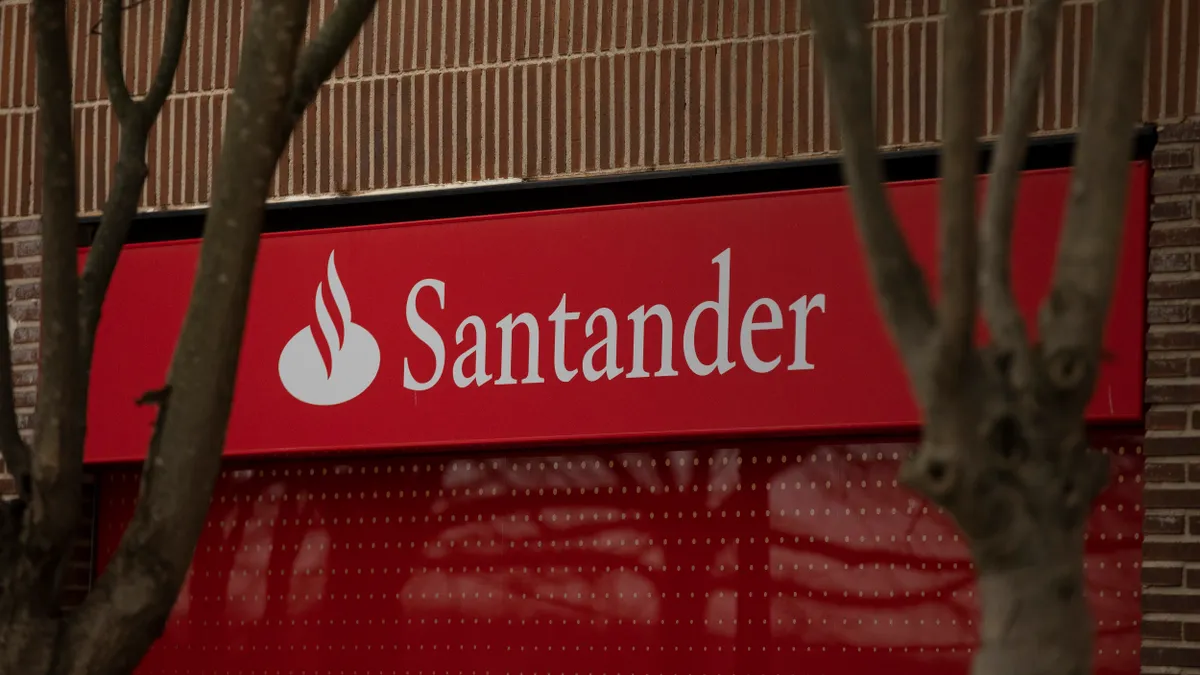Commerzbank named its CFO, Bettina Orlopp, as its next CEO on Tuesday, as the German lender’s board met to discuss strategy to fend off a rapid buy-up of the bank’s stock by Italian bank UniCredit.
Orlopp will replace Manfred Knof, who told Commerzbank this month he would step down when his contract ends in December 2025.
“I am grateful for the trust of the Supervisory Board and all stakeholders of this exceptional bank,” Orlopp said in a statement. “I am looking forward to this new challenge, which I take with respect but also with confidence. ... While we have a strategy that is effective, significant tasks lie ahead. Together with all our key partners, we will navigate through the challenges ahead of us successfully.”
In the near term, keeping a potential acquirer at bay may represent the most pressing of the “significant tasks.”
“I feel like vomiting when I hear his promises of cost savings," Uwe Tschaege, the deputy chair of Commerzbank’s board, said Tuesday in front of the bank’s Frankfurt headquarters.
The promises are UniCredit CEO Andrea Orcel’s.
UniCredit, Italy’s second-largest lender, amassed a small stake in Commerzbank this month, then doubled it roughly two weeks ago, when the German government offloaded 4.5% of the bank’s shares in a market placement.
Germany may have expected the €700 million bloc of shares to be spread among several buyers. But UniCredit outbid the field and took the lot.
What’s more, UniCredit announced Monday that it sought to double — again — its stake in Germany’s second-largest bank.
“UniCredit believes that there is substantial value that can be unlocked within Commerzbank, either stand-alone or within UniCredit, for the benefit of Germany and the bank's wider stakeholders,” the Italian bank said.
UniCredit is entering derivatives contracts to acquire a further 11.5% of Commerzbank to bring its total holdings to around 21%. But it has applied to hold up to 29.9%, it said. The bank filed its request with German financial regulator BaFin. The European Central Bank has 60 days — 90 if an extension is filed — to rule on the request once it receives the paperwork from BaFin.
UniCredit can’t claim the full 21% until then, the bank said.
The move, however, sparked concern in Germany that the Italian bank’s gradual acquisition of shares is turning hostile.
“We don’t want this,” Tschaege said Tuesday, according to Reuters.
‘180 ... within 48 hours’
Stefan Wittmann, a senior official with the trade union Ver.di who also sits on Commerzbank’s board, said UniCredit’s announcement Monday caught the German lender by surprise.
It was a “180 degree-turn within 48 hours,” Wittmann told CNBC, adding that Orcel “last spoke on Friday that he wanted a friendly takeover in agreement with all stakeholders and politicians.”
“That doesn’t add up,” Wittmann told the network.
Commerzbank called on the German government Tuesday to review the situation, Wittmann said.
Two-thirds of Commerzbank jobs are at risk if UniCredit succeeds in a hostile takeover, he said at Tuesday’s meeting, according to CNBC.
“We consider this to be a completely inappropriate aggressive act,” Wittmann told Bloomberg on Monday.
Tschaege, too, said Commerzbank’s management is “astounded and angry” by Orcel’s behavior, according to the wire service.
“He is not interested in what the government or Commerzbank says,” Tschaege said. “This is not a friendly act.”
Treading with caution
The German government, for its part, appears to be treading with caution.
“We have taken note of UniCredit’s actions — we do not support a takeover. We have informed UniCredit of this,” a spokesperson for Germany’s finance ministry official said in a statement. “The German government supports Commerzbank’s strategy of independence.”
German Chancellor Olaf Scholz weighed in Monday, too — saying, “unfriendly attacks, hostile takeovers are not a good thing for banks and that is why the German government has clearly positioned itself in this direction.”
Germany injected billions of euros into Commerzbank to rescue it during the 2008 financial crisis. But the country, concluding the bank is “stable and profitable” has sought to downsize its stake. Germany holds a 12% share of Commerzbank — meaning UniCredit, ahead of any ECB approvals, ranks as the German bank’s second-largest shareholder.
Germany said Friday it would not sell any more shares of the bank. That, combined with the German government’s refusal to negotiate with UniCredit over the remaining federal stake in Commerzbank, prompted the Italian bank’s shift in strategy, the Financial Times reported, citing unnamed sources.
Orcel said last week “it would be an aggressive move” to launch an unsolicited tender offer to buy out other investors in Commerzbank, according to Reuters.
He also credited the German government’s “trust” in UniCredit when the Italian bank bought its first 4.5% stake in Commerzbank.
But people familiar with Orcel’s thinking told The Wall Street Journal he has been frustrated at the German government’s lack of engagement regarding UniCredit’s intentions.
Competing with Wall Street
UniCredit, in its statement Monday, cited a recent report from former ECB President (and ex-Italy Prime Minister) Mario Draghi, who emphasized that Europe needs banks with cross-border capacity to compete against Wall Street and China juggernauts.
Draghi’s view seems bolstered by comments Tuesday from a European Commission spokesperson.
“Mergers could make banks more resilient to shocks due to greater asset diversification,” the spokesperson told Reuters, adding that the panel did not comment on specific cases. “[Mergers] would allow European banks to have more efficient business models, pursue growth strategies and invest in digitalization.”
Italy’s foreign minister, Antonio Tajani, on Monday also held up the view that Europe is a single market.
“This is an internal market. Being pro-European only in words leaves something to be desired," Tajani said, according to Reuters. “UniCredit is a big Italian bank and it is doing well to act within the internal market.”
‘Disaster’ and timing
However, a takeover of Commerzbank by UniCredit would be a “disaster for the German banking sector,” Friedrich Merz, leader of Germany’s opposition party, told the Financial Times.
Commerzbank counts roughly 25,000 small and midsize commercial clients and a significant share in export finance. The fear is that those clients may leave if a merger looks inevitable. Those that stay may find loans more elusive as UniCredit’s credit rating is lower than Commerzbank’s.
UniCredit argued Monday that it is no stranger to the German market, having bought Munich-based HypoVereinsbank in 2005.
As sudden as Monday’s move may seem, Orcel may be playing the long game. UniCredit at least twice — in 2017 and 2022 — approached Commerzbank suggesting a tie-up.
Timing may also factor into UniCredit’s stake-building. The buy-up that pushed the Italian bank’s stake in Commerzbank from 4.5% to 9% came one day after Knof announced his pending departure.
Commerzbank on Tuesday said it has begun a search for Orlopp’s successor as CFO. Orlopp is expected to hold both the CEO and CFO roles during a transitional period after handoff, the bank said, adding that it has also named Michael Kotzbauer as deputy CEO. Orlopp and Kotzbauer will hold five-year terms.
Wittmann on Tuesday said Commerzbank may lean on the German government to find an investor that would help keep the lender independent.
“This takeover debate will not be over until the last argument has been exchanged and the last barrier has fallen. And there is a very, very long way to go until then,” Wittmann said. “Mr. Orcel should be prepared for this.”





















